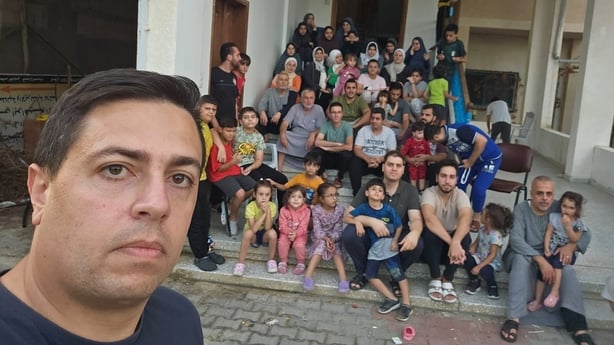A Dublin woman has said that 28 members of her extended family have been killed in Gaza over the past eight days during Israeli air strikes.
In a post on X, Yara Alagha said that seven of those who died were children.
The 27-year-old's mother comes from the West Bank, while her father is from Gaza.
It is understood that 11 members of her extended family were killed yesterday when their building was shelled by Israeli forces.
She posted that four Palestinian killed in Khan Younis his evening were family members.
Speaking to RTÉ News last night, Ms Alagha said that "every Gazan at this point has been visited by grief and destruction".
She said: "Those of my family left are sending us messages telling us they are starving.
"My cousin, a senior engineer in Ireland, sent me a message pleading that I tell the world that him and his family, including three kids, are starving."
We need your consent to load this rte-player contentWe use rte-player to manage extra content that can set cookies on your device and collect data about your activity. Please review their details and accept them to load the content.Manage Preferences
Under an Israeli blockage, no food, medical supplies or fuel is being allowed into Gaza. Ms Alagha added: "No where is safe; there are no refuge centres or sanctuaries."
She said: "You will notice patterns of those killed that there are often a number of deaths in the same family, this is because families choose to stick together so that if they are bombed, they all die together and nobody is left behind to grieve alone."
Ms Alagha added: "There is no other way to comprehend this, it is a genocide. And we are all living spectators."
Ms Alagha was born and brought up in Dublin but is currently living in London.
I'm always thinking 'is this my last day?' says Palestinian-Irish man
Her cousin, Ibrahim Alagha, who is Palestinian-Irish, is currently trying to organise safe passage out of Gaza with his wife Hamida, and their three young children, after they travelled over from Dublin to visit family members in June.
Speaking to RTÉ from Khan Younis, a city in the south of Gaza which is about 20km from the Egyptian border, he said he and up to 80 others are staying in the same place.
He said: "There's no food, there’s extremely limited water, and [we] don’t have electricity, we only rely on a small solar system to charge our phone.
"Internet is extremely limited; it comes and goes."

"During the night we can hear the sound of rockets and bombings everywhere around us.
"It’s extremely extremely stressful, I’m always thinking, I’m always thinking 'is this my last day? Will I be able to see another day or not?’ - that’s always what is in my mind."
Mr Alagha said that sourcing food is becoming more difficult each day.
"There is some small bakeries or shops that still have some food. So we send down some of the guys to go.
"Today they were waiting over five hours in a queue just to get some canned food and some rice.
"Just very basic stuff that would keep us going only for today.
"We’re not sure are we going to be lucky tomorrow to be in a queue and get something.
"I was thinking that we will be in a stage where the only food in front of us will be tree leaves to be honest with you, or grass. There is nothing.
"I’ve lost around 10kg-15kg since the beginning of the war, in the ten days.
"When I look at my children and they ask me for water or food I get really angry because I can’t do anything for them."
Tánaiste Micheál Martin has said the Government is working to assist Irish citizens in Gaza, in conjunction with authorities there.
He said he had been careful in terms of his public comments, given the challenging and fraught situation on the ground.
But he said efforts were ongoing to assist Irish citizens in whatever way possible. Mr Martin said in this regard, much depended on the opening of the Rafah crossing, a southern border between Gaza and Egypt.
He said he hoped the situation could be de-escalated and that Israel would remain mindful of international law, when framing its response to the Hamas attacks.
He said Israel had suffered the greatest loss of life since the holocaust, but he said it was important to distinguish between Palestinians, and those living in Gaza, from Hamas.
He said the Government was working with neighbouring countries to try and ensure humanitarian corridors could be opened, to get health supplies as well as food and water in to Gaza.
Mr Martin is in daily contact with the Chief of Staff of the Defence Forces, given fears about the potential for the conflict to spread to areas where Irish peacekeepers are deployed.
He said the situation in that regard was being continually monitored.
Additional reporting: Pat McGrath and Gavin O'Callaghan







